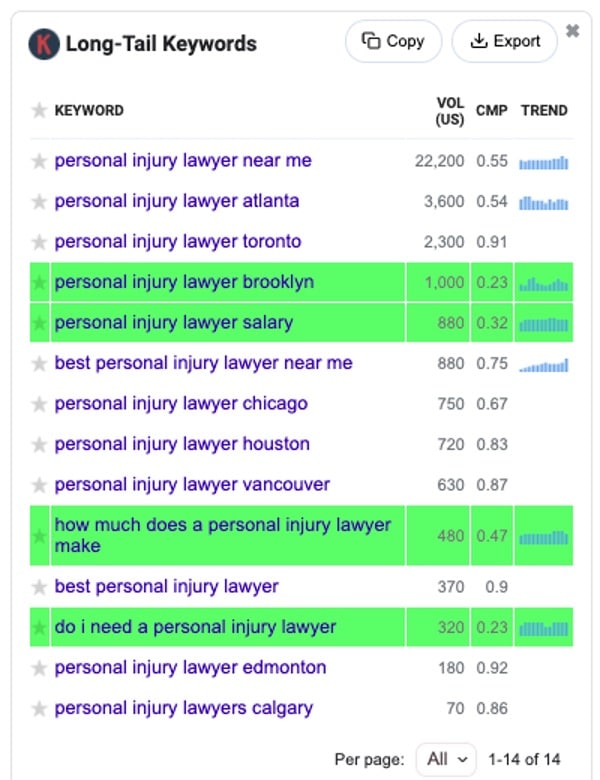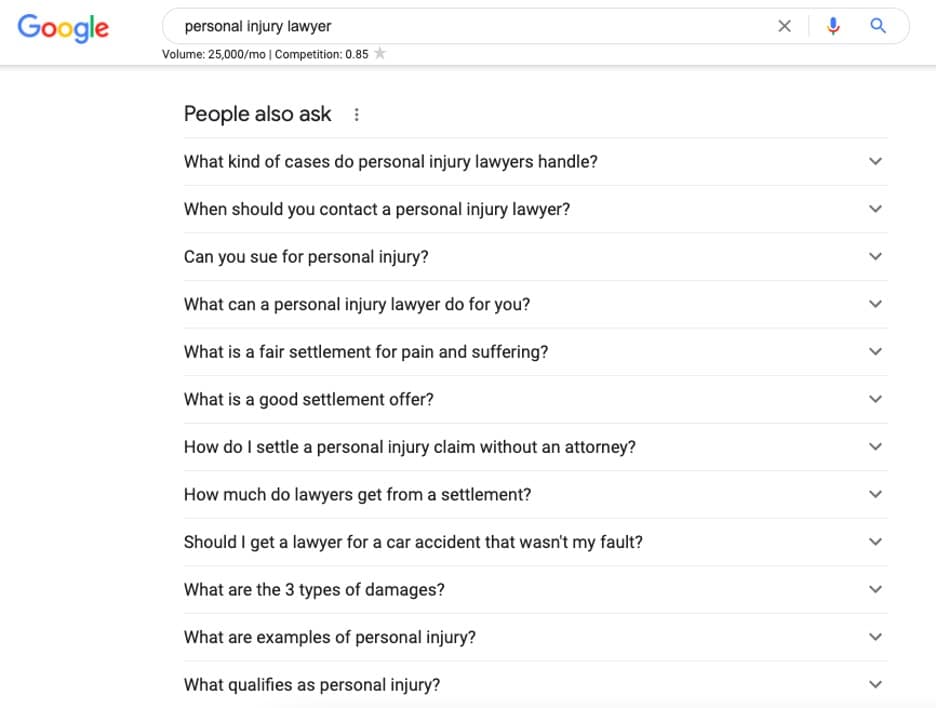Last updated on June 28th, 2021
Digital marketers can be such suckers for overhyped fads and trends. It’s true—I know from experience.
Some fast-fading fads that come to mind are automated cross-channel social media posting, “fluff copy from content mills, gamification, the banner ad frenzy, levering social or political movements for business gain…the list is long.
So it’s easy to understand why some folks are skeptical when they hear about the “latest and greatest” new tool or strategy that will get you 1 million views in 1 day or promises to finally get your site to rank on Page 1 of Google.
You might be thinking that “keyword clustering” is just the most recent overblown fad, but in this article I’ll explain why you might want to reconsider and take a closer look at this content strategy. While I won’t waste your time claiming that keyword grouping is the end-all-be-all solution to get your site to rank, I do believe that it can be an important and valuable tool in your SEO toolbox.
So how do you do keyword clustering, and how can this approach benefit your business?
We’ll get to these questions and more below, but first we need to clearly define:
What is keyword clustering?
Fads come and go, but keyword clustering (or “keyword grouping”) is a natural evolution in SEO content strategy that reflects the ability of search algorithms—including Google, Yahoo!, Bing and DuckDuckGo—to better understand how different pieces of content and words relate to each other.
Personally, I like to think of keyword grouping like playing the game of Scrabble, except instead of organizing letters into words your task is to organize keywords into content topics.
The fundamental principle of keyword clustering is that nothing exists in a vacuum, especially online. The pages on your website don’t stand alone, but rather they are supported by other landing pages, blog posts, etc. Likewise, the search terms internet users enter into the search box aren’t singular. A person might confine their search to a certain phrase or word, but they are likely interested in a wide range of similar (“semantic”) search terms and phrases.
For example, here’s a screenshot of a search I ran for “personal injury lawyer” and a small sampling of the related long-tail keywords that pulled up in the results (using the Keywords Everywhere plugin):
By grouping together terms used by people with similar intent, keyword clusters better position a URL or domain to dominate the search results for a certain “bucket” of related keywords.
In short:
If you’re focusing on just a single keyword string per page, then you’re losing out on literally hundreds of keyword ranking opportunities.
Here’s how other industry thought leaders define what keyword clustering is and how this approach is beneficial:
- “Simply put, it’s keyword grouping categorized by (1) a common secondary keyword modifier which is how most tools approach it or (2) Google’s search engine results similarity. At the heart of it, keyword clustering is what it sounds like: you are taking relevant keywords and clustering them together into groups. Those groups work together to give your website a more thoroughly categorized theme, which in turn helps to establish its purpose and attract those crawlers that tell Google that page is one they should bump up the list.” – Search Engine Watch
- “Keyword clusters are groups of keywords that represent searchers with similar purchase intent… If you instead get your web page ranking for your primary keyword and the long-tail variants and related subtopics, your page will often end up ranking for 10-20x the amount of keywords and pick up significantly more traffic.” – Search Engine Journal
- “Keyword clustering is the process of clustering keywords into themes that are relevant to your website pages. A single cluster includes a core topic and several related subtopics, which support and point back to the core topic. Keyword clustering allows you to target many keywords per page, rather than only one or two keywords, creating additional opportunities for content to be found online.” – SimpliLearn
- “Keyword grouping, or the process of organizing keywords into closely related groups, is an important part of both organic and paid search marketing…keyword grouping is important for SEO, too, because it helps you create content that is optimized for clusters of related keywords. This helps your content rank higher in the search results and better meet the intent of your readers, too. That is to say, you’ll be able to provide answers to the questions they’re searching for as well as the questions they didn’t even know they had.” – Wordstream
How to succeed at keyword grouping
Putting together strategic keyword clusters takes practice.
To get started, consider these 5 steps:
1. Build a comprehensive list of keywords
Gather every possible keyword that people might reasonably use to find your website—from the most concise descriptive terms to the so-called “long-tail” keywords that are often questions typed into a search query.
But where oh where to find these keywords?
It will depend on the time, resources and dedicated digital marketing staff you have at your disposal. If you simply don’t have the bandwidth to manage this on your own, consider partnering with a digital marketing company that has access to (and experience with) professional-grade keyword data tools like SEMrush, Moz and others. These specialists can also access search query data available in Google Analytics and Search Console to provide further insights into how people are finding your website.
While all of these modern tools that can instantly generate hundreds (or even thousands) of keywords are great, don’t forget to come up with possible keywords the old-fashioned way—by asking your team to think about every possible way a customer or client might search for your product or service online.
Think like a customer and figure what you would be asking the search engine if you were in the market for your product or service.
Also, take some time to type your ideas into the Google search box. Let the drop-down menu do some work for you by taking note of what the search results suggestions are based on what real people are searching for:
2. Group similar terms
Once you’ve collected a giant list of keywords, it’s time to organize. By now, your list is likely so huge that it’s unworkable, so it’s time to break it down into groups and clusters. Look for patterns in words and terms that are consistently recurring throughout. Start grouping them together by their commonalities.
For example, if you run a home improvement business, you might’ve found a lot of terms related to “remodel my kitchen.” These related keywords might cover everything from “how much does it cost to remodel my kitchen” to “what tools do I need to remodel my kitchen” to “how long will it take to remodel my kitchen.” Bucket all of these semantic terms together until you’ve organized your big list.
3. Review for relevancy and value
Once organized, look at all your keywords and keyword clusters. There’s a good chance that some groups simply aren’t relevant to your particular business or particularly profitable to you. This is normal, since keyword tools generally list terms that might make sense for your industry generically but aren’t applicable to the precise service you provide.
SEO is all about precision.
Realistically, you probably won’t be able to rank for every keyword phrase or term in your industry, so don’t hesitate to get rid of irrelevant or unimportant terms and clusters if they don’t match up with what you do.
4. Map the keywords to existing content ideas
Moving down your list, start adding links to your existing web pages that relate to each group—everything from a general service page that’s under your main menu to the blog post you wrote 4 years ago. It all matters.
Next, look for opportunities to add those keywords to the headers, subheaders, copy and meta tags of existing pages (if they are not already there).
A word of warning:
Don’t go overboard with inserting keywords. Keyword “stuffing, as it’s known, can be easily spotted by search engines and they may penalize your page for it, thus negating all of your efforts to boost the page’s SERP ranking. Black-hat SEO won’t deliver long-term results.
It will likely be impossible to jam every single keyword into your content while still keeping the page readable to a normal human being. That’s okay.
Conduct a thorough review of your site and insert the new terms where they won’t interrupt the flow. Then, use the rest of the keywords in the backend part of the post such as SEO meta tags to help search engines understand what your content is about and how different content interrelates.
5. Create new content
It’s likely there are some keyword groups where the relevant content on your site was light or non-existent. That means there’s a segment of the market that you’re missing—a content gap.
If you don’t have an existing page addressing that keyword cluster, then you have a perfect future topic idea. Use the keywords in the cluster to build out a high-quality, comprehensive page that covers all related keywords in that group—everything from an FAQ page to a blog post to a featured service page.
Similar to the word of caution discussed above, don’t go overboard with the keywords when writing a new page but rather mix in a few of the most important ones and rely on tagging to include the rest.
Ready, set, group!
It’s that simple, folks…
Okay, yeah — like Scrabble it can take a good bit of time and brainpower to organize massive lists of keywords and related search terms. But it basically boils down to finding tools that will tell you how your potential customers are searching for your product and service, creating and identifying relevant content for that audience and then communicating to search engines how all your content interrelates.
Keep it simple and don’t get overwhelmed.
In our experience, the reward is well worth the effort.
What is your opinion of and approach to keyword clustering?
Post a comment below or on Facebook and let us know!



